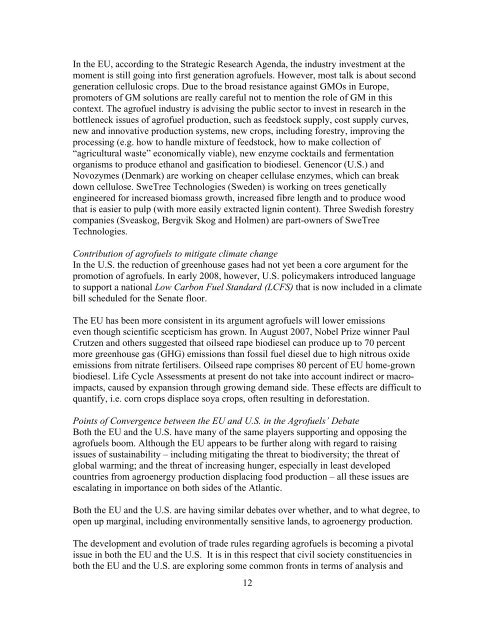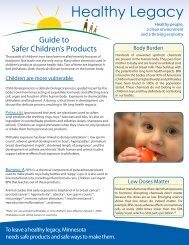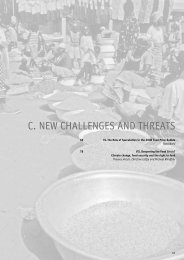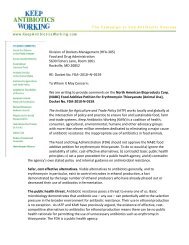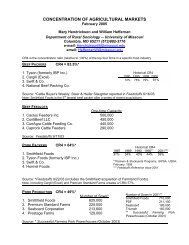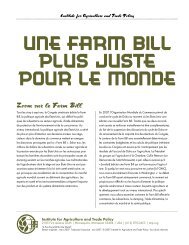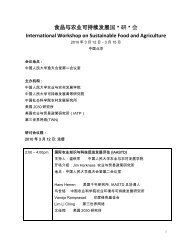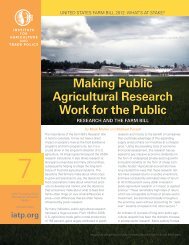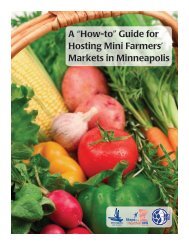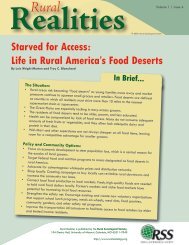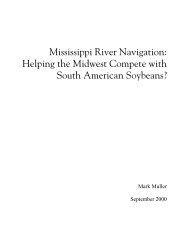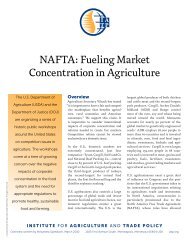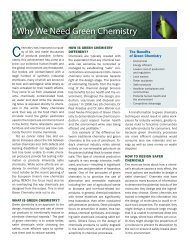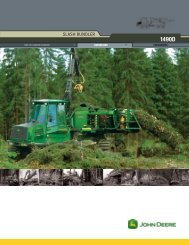Agrofuels: Opportunity or Danger? - Institute for Agriculture and ...
Agrofuels: Opportunity or Danger? - Institute for Agriculture and ...
Agrofuels: Opportunity or Danger? - Institute for Agriculture and ...
You also want an ePaper? Increase the reach of your titles
YUMPU automatically turns print PDFs into web optimized ePapers that Google loves.
In the EU, acc<strong>or</strong>ding to the Strategic Research Agenda, the industry investment at the<br />
moment is still going into first generation agrofuels. However, most talk is about second<br />
generation cellulosic crops. Due to the broad resistance against GMOs in Europe,<br />
promoters of GM solutions are really careful not to mention the role of GM in this<br />
context. The agrofuel industry is advising the public sect<strong>or</strong> to invest in research in the<br />
bottleneck issues of agrofuel production, such as feedstock supply, cost supply curves,<br />
new <strong>and</strong> innovative production systems, new crops, including f<strong>or</strong>estry, improving the<br />
processing (e.g. how to h<strong>and</strong>le mixture of feedstock, how to make collection of<br />
“agricultural waste” economically viable), new enzyme cocktails <strong>and</strong> fermentation<br />
<strong>or</strong>ganisms to produce ethanol <strong>and</strong> gasification to biodiesel. Genenc<strong>or</strong> (U.S.) <strong>and</strong><br />
Novozymes (Denmark) are w<strong>or</strong>king on cheaper cellulase enzymes, which can break<br />
down cellulose. SweTree Technologies (Sweden) is w<strong>or</strong>king on trees genetically<br />
engineered f<strong>or</strong> increased biomass growth, increased fibre length <strong>and</strong> to produce wood<br />
that is easier to pulp (with m<strong>or</strong>e easily extracted lignin content). Three Swedish f<strong>or</strong>estry<br />
companies (Sveaskog, Bergvik Skog <strong>and</strong> Holmen) are part-owners of SweTree<br />
Technologies.<br />
Contribution of agrofuels to mitigate climate change<br />
In the U.S. the reduction of greenhouse gases had not yet been a c<strong>or</strong>e argument f<strong>or</strong> the<br />
promotion of agrofuels. In early 2008, however, U.S. policymakers introduced language<br />
to supp<strong>or</strong>t a national Low Carbon Fuel St<strong>and</strong>ard (LCFS) that is now included in a climate<br />
bill scheduled f<strong>or</strong> the Senate flo<strong>or</strong>.<br />
The EU has been m<strong>or</strong>e consistent in its argument agrofuels will lower emissions<br />
even though scientific scepticism has grown. In August 2007, Nobel Prize winner Paul<br />
Crutzen <strong>and</strong> others suggested that oilseed rape biodiesel can produce up to 70 percent<br />
m<strong>or</strong>e greenhouse gas (GHG) emissions than fossil fuel diesel due to high nitrous oxide<br />
emissions from nitrate fertilisers. Oilseed rape comprises 80 percent of EU home-grown<br />
biodiesel. Life Cycle Assessments at present do not take into account indirect <strong>or</strong> macroimpacts,<br />
caused by expansion through growing dem<strong>and</strong> side. These effects are difficult to<br />
quantify, i.e. c<strong>or</strong>n crops displace soya crops, often resulting in def<strong>or</strong>estation.<br />
Points of Convergence between the EU <strong>and</strong> U.S. in the <strong>Agrofuels</strong>’ Debate<br />
Both the EU <strong>and</strong> the U.S. have many of the same players supp<strong>or</strong>ting <strong>and</strong> opposing the<br />
agrofuels boom. Although the EU appears to be further along with regard to raising<br />
issues of sustainability – including mitigating the threat to biodiversity; the threat of<br />
global warming; <strong>and</strong> the threat of increasing hunger, especially in least developed<br />
countries from agroenergy production displacing food production – all these issues are<br />
escalating in imp<strong>or</strong>tance on both sides of the Atlantic.<br />
Both the EU <strong>and</strong> the U.S. are having similar debates over whether, <strong>and</strong> to what degree, to<br />
open up marginal, including environmentally sensitive l<strong>and</strong>s, to agroenergy production.<br />
The development <strong>and</strong> evolution of trade rules regarding agrofuels is becoming a pivotal<br />
issue in both the EU <strong>and</strong> the U.S. It is in this respect that civil society constituencies in<br />
both the EU <strong>and</strong> the U.S. are expl<strong>or</strong>ing some common fronts in terms of analysis <strong>and</strong><br />
12


